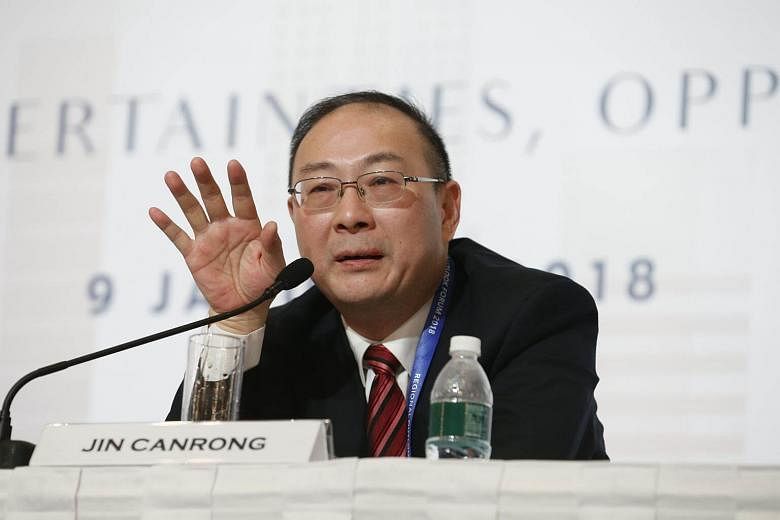SINGAPORE - China's President Xi Jinping has changed the style of Chinese foreign policy from a stance that is reactive, to a more proactive approach where China is not afraid to wield a stick.
Chinese expert Professor Jin Canrong shared this view at the Regional Outlook Forum held here on Tuesday (Jan 9).
Describing how Chinese diplomacy has changed under Mr Xi, Prof Jin noted that China used to "show a smiling face to everybody" and offer only carrots instead of sticks. But that approach has now become more complicated.
"It used to be that we kept a more reactive approach, waiting for our American friends to take the lead and initiate things, but now China's style has changed a little from being reactive to proactive," said Prof Jin, who is associate dean of Renmin University of China's School of International Studies.
This means that China would now be more active in global governance and "try to take the lead", he said at a panel on US-China relations and their implications for Asean.
"Unfortunately our US friends find our new style as assertiveness and even aggressiveness," he added.
He was responding to a question from Singapore's Ambassador-at-large Tommy Koh, who asked how China's foreign policy has changed under Mr Xi.
Prof Jin said China's foreign policy used to have four areas of focus: dealing with big powers, its neighbourhood, developing countries and multilateral organisations.
But under Mr Xi, this has shifted to these areas: the Belt and Road Initiative (BRI), protecting China's overseas national interests, spreading Chinese soft power, and to a drive to "try to take the lead in global governance."
Prof Jin added that Chinese leaders now define China as a global power, from a regional power previously.
Under Mr Xi who came to power in 2012, China has become more assertive, even aggressive, as it seeks to become a leader on the world stage, a marked departure from the late Deng Xiaoping's cardinal rule to the party to "hide your strength and bide your time".
Mr Xi launched the BRI in 2013, a massive infrastructure project aimed at connecting China by land and sea to South-east Asia, Pakistan and Central Asia, and Middle East, Europe and Africa. The plan, while aimed at boosting trade, is also widely viewed as an initiative to spread Chinese influence.
Earlier during the discussion, Prof Jin also pointed out that although the Chinese government has spent a lot of effort establishing good ties with US President Donald Trump and his team, there could be "some trouble" in the future.
He cited the US' recent National Security Strategy report which defined China as a "revisionist" country and a "strategic competitor".
On the panel with Prof Jin was Dr Michael J. Green of the Centre for Strategic and International Studies, who offered the US perspective. The panel was moderated by Singapore's Ambassador-at-large Ong Keng Yong.
Dr Green noted that China's touted "new model of great power relations" held both positive and negative aspects.

While the model tries to avoid confrontation between China and the US, it also defines great powers as China, Russia, the US and the European Union, excluding countries such as Japan, Korea and India.
"From the US perspective that is a formula that weakens American influence and interests in the region," said Dr Green, who is senior vice president for Asia and Japan chair at the Washington-based Centre.
He added that the US wants India, Japan and other middle and major powers to also be influential in the region because it is confident that "these countries want an open regional architecture, and are going to guard against coercion by China".
"The US is more inclined to favour a kind of multipolarity in Asia where India, Japan and others are standing forward to maintain a favourable strategic equilibirum," he said.
He also said while the US has an interest in Asean centrality in the region, they have been given pause after what "Beijing was able to do to break Asean consensus" in 2016.
That year, the Permanent Court of Arbitration denied China's claims in the South China Sea - of which some Asean members have competing claims - but Asean leaders had failed to issue a joint response to the ruling because Cambodia blocked any mention against Beijing.
Held at the Shangri-La Hotel, the forum is organised by the ISEAS-Yusof Ishak Institute think-tank.
The annual event, now in its 21st year, drew about 700 people, including civil servants, academics and students, who listened in on expert panels discussing trends and developments in the region.


